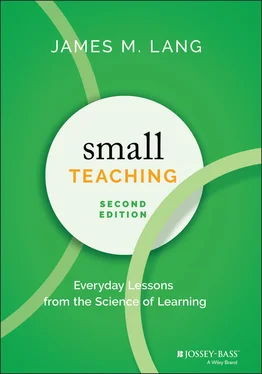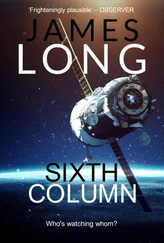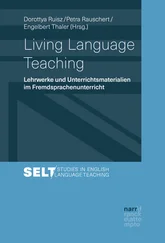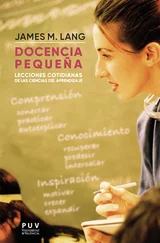Library of Congress Cataloging-in-Publication Data
Names: Lang, James M., author.
Title: Small teaching : everyday lessons from the science of learning / James M. Lang.
Description: Second edition. | [San Francisco] : Jossey-Bass, [2021] | Includes bibliographical references and index.
Identifiers: LCCN 2021024090 (print) | LCCN 2021024091 (ebook) | ISBN 9781119755548 (cloth) | ISBN 9781119755562 (adobe pdf) | ISBN 9781119755555 (epub)
Subjects: LCSH: Cognitive learning. | Thought and thinking—Study and teaching.
Classification: LCC LB1062 .L349 2021 (print) | LCC LB1062 (ebook) | DDC 370.15/23—dc23
LC record available at https://lccn.loc.gov/2021024090
LC ebook record available at https://lccn.loc.gov/2021024091
Cover design: Wiley
SECOND EDITION
For Katie, Madeleine, Jillian, Lucie, and Jack, who taught me much when they were small
First and foremost, I must express my gratitude for monthly writer's group meetings with Mike Land and Sarah Cavanagh, during which I received wise and helpful feedback on every chapter of this book, both the first and second editions. Mike and Sarah served perfectly as advanced and interested readers, and they made this a better book in every way possible. Special thanks to Sarah for helping me avoid glaring errors in my use of terminology and theories from her home discipline of psychology, and for pointing me to numerous articles that helped thicken my research.
I had the opportunity to present the research from this book—and to test out its applicability to instructors—at many colleges and universities while I was drafting and revising the first edition. So thanks to my hosts and workshop participants at Olds College (Canada), Misericordia University, Regis College, the University of Denver, Fisher College, Florida Institute of Technology, King's Academy (Jordan), MacEwan University (Canada), Indiana State University, the DeLange Conference at Rice University, the University of Texas–San Antonio Health Sciences College, Bucknell University, Georgia Tech, and Columbus State Community College. Thanks as well to the many dozens of institutions around the globe that invited me to share the ideas of this edition with their faculty after the first edition was published. They provided me with a welcome platform to receive feedback upon, and continue to refine the book's theories and models for this second edition.
The seeds for this book were first planted at a meeting with David Brightman at the Teaching Professor Conference in New Orleans, and he was an excellent guide as I worked my way through the conception and proposal stages. His commitment to higher education and to publishing excellent books made him an ideal editor. Pete Gaughan and Connor O'Brien at Wiley proved equally dedicated to the project, and my thanks especially to Connor for his developmental notes on the first draft of the book. The second edition was suggested and shepherded to life by Amy Fandrei, to whom I am grateful as well.
Many colleagues at Assumption University, both faculty and administrative, have been supportive of my work. I am grateful to the University for the two sabbaticals which enabled me first to complete the book and then, six years later, undertake the second edition.
I wrote the vast majority of the first edition at Nu Kitchen in Worcester, Massachusetts. I thank them for all the green tea, about which you will read further in Chapter Two. It seemed to help. The second edition was completed largely at home, as a result of the pandemic. Thanks to DAVIDsTEA for supplying my habit from afar.
I come from a family of teachers; it must have been something in the water where we grew up. I continue to find inspiration from them, especially from my sister, Peggy, who has served as both teacher and principal to urban student populations in Chicago. Also from my brother, Tony, at whose heels I have been tagging along as a student and teacher and writer and human being since we were childhood bunkmates. My mother was the first teacher in the family, and my father continues to teach me to this day.
Much of my extracurricular thinking about learning happens as a result of observing the experiences of my children, to whom this book is dedicated, so thanks to them for the enthusiasm they have always shown for learning, both in and out of school.
Even more of my thinking about education happens as a result of conversations with my wife, an elementary school teacher. For part of the time that I was writing the first edition, I spent Friday mornings volunteering in her kindergarten classroom, and while I was working on the second edition during the pandemic I could hear her teaching her remote kindergarten classes from the dining room all day long. Observing and hearing her teach reminded me constantly of the incredible value of teaching as a profession and of the selfless commitment that so many teachers make to their students. Those reminders continually renewed my inspiration to write this book.
So a final and most heartfelt thanks to Anne—for everything.
James M. Langis a professor of English and director of the D'Amour Center for Teaching Excellence at Assumption University in Worcester, MA. His books about teaching and learning include Distracted: Why Students Can't Focus and What You Can Do About It (Basic Books, 2020); Small Teaching Online: Applying Learning Science in Online Classes (with Flower Darby, Jossey-Bass, 2019); and Cheating Lessons: Learning From Academic Dishonesty (Harvard University Press, 2013). He writes a monthly column on teaching and learning for the Chronicle of Higher Education ; his work has been appearing in the Chronicle since 1999. He edits a series of books on teaching and learning in higher education for West Virginia University Press; he co-edited the second book in the series, Teaching the Literature Survey Course: New Strategies for College Faculty (2018). He has conducted workshops on teaching for faculty at more than a hundred colleges or universities in the US and abroad, and consulted for the United Nations on the development of teaching materials in ethics and integrity for college faculty. In September of 2016 he received a Fulbright Specialist grant to work with three universities in Colombia on the creation of a MOOC (massive, open online course) on teaching and learning in STEM education. He has a BA in English and philosophy from the University of Notre Dame, an MA in English from St. Louis University, and a PhD in English from Northwestern University. Follow him on Twitter at @LangOnCourse, on Instagram at @jimlang7 or visit his website at http://www.jamesmlang.com.
Preface to the Second Edition
Every year in late December people around the world make resolutions to change their lives. January 1 stmarks the beginning of new habits and attitudes, new ways of being a good human, and new approaches to the problems and addictions that plague us. I'm one of those people; I especially love to make big resolutions. I like it so much I don't limit myself to making them for the new year. My wife has now learned, after many years of living with me, to dread those moments in which I accost her while she's quietly reading her book and pronounce exuberantly: “I've got an incredible idea—it's going to change our lives!” She rolls her eyes, listens to my proposal, nods and smiles, and goes back to her book. She knows to do this because the follow-through on the big resolutions I make typically lasts only until a new one comes along, at which point I track down my wife and let her know that no, that last one was stupid, but this time I really have a great idea.
Читать дальше












